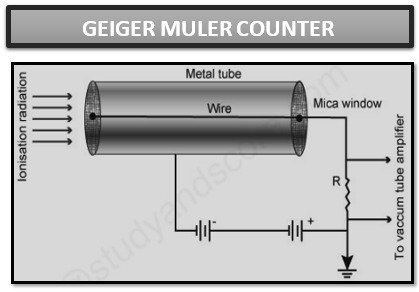Geiger-Muller counter, invention, components, uses
Geiger-Muller counter, invention, components, uses

Geiger-Muller counter, invention, components, uses
What is Geiger-Muller counter?
A Geiger-Muller counter, also known as a Geiger counter or radiation detector, is a device used to detect and measure ionizing radiation.
Who invented Geiger-Muller counter?
The Geiger-Muller counter was developed by two German scientists Hans Geiger and Walter Müller in the early 20th century. Hans Geiger, a physicist, and Walter Müller, an engineer, worked together to design and develop the device in 1928.
Hans Geiger, known for his work in nuclear physics, originally invented the Geiger-Muller tube, an important part of the counter. The Geiger-Muller tube was developed to detect and measure ionizing radiation using the ionization produced in a gas-filled chamber.
Geiger later collaborated with electronics and instrumentation expert Walter Müller to refine and improve the device's design. Together they developed the Geiger-Muller counter, which is widely used to detect and measure radiation.
The Geiger-Muller counter revolutionized radiation detection technology and played a vital role in fields such as nuclear physics, radiology, radiation protection and environmental monitoring. Hans Geiger and Walter Müller's contributions to the invention of the Geiger-Müller counter have greatly influenced the understanding and application of ionizing radiation.
Components of a Geiger-Muller counter:
The components of a Geiger-Muller counter typically include:
Geiger-Muller Tube:
The Geiger-Muller tube is the most important part of the meter. It is a gas-filled tube, usually cylindrical, with a central wire electrode (anode) surrounded by a cylindrical metal tube (cathode). The tube is usually filled with an inert gas such as helium, argon or a low pressure gas mixture.
High Voltage Power Supply:
A high voltage power supply is required to create an electric field in the Geiger-Muller tube. The applied voltage typically ranges from a few hundred volts to several thousand volts, depending on the design and application.
Preamplifier and amplifier:
The electrical pulses created by the ionizing radiation interacting with the gas in the tube are very weak. A preamplifier is used to amplify these weak pulses and the amplifier further amplifies the signal to make it measurable and suitable for post processing.
Voltage divider:
A voltage divider circuit is often included to divide the high voltage from the power supply to create appropriate voltage levels for the various parts of the Geiger-Muller counter, such as the anode, cathode, and amplifier circuits.
Signal Processing Circuitry:
The meter also includes circuitry for processing the amplified signal from the preamplifier and amplifier. This circuitry may include shaping circuitry to convert the pulses into a form suitable for further processing such as counting or timing the pulses.
Audible or Visual Indicator:
Geiger-Muller counters usually have an audible or visual indicator to provide instant feedback on the detected radiation. The audible indicator is often a speaker that emits clicks or beeps for each ionization event detected. The visual indicator can be in the form of a meter, a row of LEDs, or a digital display showing count rate or accumulated dose.
Operation and user interface:
The meter may have controls to adjust the sensitivity or threshold for detecting radiation, as well as a user interface to display additional information or allow the user to interact with the device.
It's worth noting that the exact components and design of a Geiger-Muller counter can vary depending on the specific model and manufacturer. However, the basic principles and key components described above are common to most Geiger-Muller counters.
Uses/Applications:
Geiger-Muller counters, or Geiger counters, are widely used in various applications for detecting and measuring ionizing radiation. Some common uses for Geiger-Muller counters are:
Radiation control and safety:
Geiger-Muller counters are widely used in nuclear power plants, research centers and industrial plants to monitor radiation levels and ensure worker safety. They can detect and measure alpha, beta and gamma rays, giving them real-time information about radiation exposure.
Environmental monitoring:
Geiger-Muller counters are used for environmental monitoring to measure background radiation levels in various locations. They help assess natural radiation levels and identify any abnormal or elevated radiation that may be of concern.
Health and medical applications:
Geiger-Muller counters play a role in medical radiography, nuclear medicine and radiation therapy. They are used to measure the radioactivity of medical isotopes, monitor radiation levels in radioactive waste, and monitor radiation exposure of medical personnel.
Education and research:
Geiger-Muller counters are widely used in educational institutions and research laboratories to teach students and researchers the principles of radiation detection. They are important tools for experiments, demonstrations and research related to radioactivity.
Emergency Response and Nuclear Accidents:
Geiger-Muller counters are equipment used by emergency response teams and first responders during nuclear accidents or incidents. They help assess radiation levels, identify contaminated areas and determine appropriate safety measures.
Personal radiation monitoring:
Geiger-Muller counters are available in portable devices that people can use for personal radiation monitoring. These devices are commonly used by professionals who work with radioactive materials and by people who live or work in environments where exposure to radiation is a concern.
Use by hobbyists and enthusiasts:
Geiger-Muller counters are sometimes used by hobbyists, enthusiasts, and those interested in the study of radioactivity. They can be used for mineral exploration, amateur radioactivity experiments, or simply as a curiosity and learning tool.
Together, Geiger-Muller counters are versatile instruments that play a critical role in radiation detection, monitoring, and safety in fields ranging from industrial applications to scientific research, healthcare, and personal use.
What's Your Reaction?





















